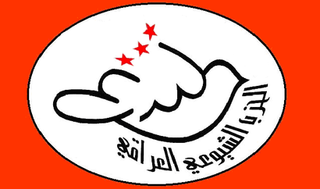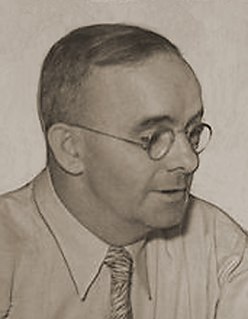Founded in October 2005 from unions that had begun organizing after the invasion, the Federation of Oil Unions of Iraq is the largest independent union consortium in Iraq, with tens of thousands of members. It fully opposes the occupation.
Founded in October 2005 from unions that had begun organizing after the invasion, the Federation of Oil Unions of Iraq is the largest independent union consortium in Iraq, with tens of thousands of members. It fully opposes the occupation.
First organized in the Southern Oil Company Union in May 2003, Iraq's oil workers began organizing what became the General Union of Oil Employees (GUOE). They have pushed to keep Iraq's resources in the hands of Iraqis, while the union remained independent of any political parties and influences from the foreign occupation. It has not affiliated to either of the two major union federations of Iraq: the Iraqi Communist Party-connected Iraqi Federation of Trade Unions or the Worker-Communist Party of Iraq-influenced Federation of Workers Councils and Unions in Iraq, but it has worked with both groupings.
As SOCU, the oil workers engaged in direct action to expel Baathist managers from oil facilities, occupation forces began moving in to attempt to take over administration of the industry. Kellogg Brown and Root (KBR) led this, and was also militantly removed by the SOCU workers, along with subcontracted laborers. With threats to strike, the union was able to gain wage increases over what the United States-led occupation was willing to pay. KBR eventually took over much of the administration of the oil industry, although resistance in the form of strikes in June and August of that year, and blockades, continued. In cases where occupation forces threatened force, the SOCU workers warned that they would be met with armed resistance.
In June 2004, the GUOE was formed from the workers of the major oil companies: Southern Oil Company, Southern Gas Company, Southern Refinery Company, Iraqi Drilling Company, the Oil Carrier Company, the Gas Packing Company, the Oil Production Company, the Oil Projects Company, and the Oil Pipe Lines Company. In May 2005, the GUOE organized a large conference against privatization with hundreds of unionists and representatives of other international groups. More strikes came in July and August, usually with outcomes favorable to the workers. In October, union president Hassan Jumaa Awad led the group to change its name to the Federation of Oil Unions of Iraq.

The International Confederation of Free Trade Unions (ICFTU) was an international trade union. It came into being on 7 December 1949 following a split within the World Federation of Trade Unions (WFTU), and was dissolved on 31 October 2006 when it merged with the World Confederation of Labour (WCL) to form the International Trade Union Confederation (ITUC).

The Workers' Commissions since the 1970s has become the largest trade union in Spain. It has more than one million members, and is the most successful union in labor elections, competing with the Unión General de Trabajadores (UGT) (historically affiliated with the Spanish Socialist Workers' Party, and with the anarcho-syndicalist Confederación General del Trabajo, which is usually a distant third.
The Communist Party USA and its allies played an important role in the United States labor movement, particularly in the 1930s and 1940s, but never succeeded, with rare exceptions, either in bringing the labor movement around to its agenda of fighting for socialism and full workers' control over industry, or in converting their influence in any particular union into membership gains for the Party. The CP has had only negligible influence in labor since its supporters' defeat in internal union political battles in the aftermath of World War II and the CIO's expulsion of the unions in which they held the most influence in 1950. After the expulsion of the Communists, organized labor in the United States began a steady decline.

The American Federation of Labor (AFL) was a national federation of labor unions in the United States founded in Columbus, Ohio, in December 1886 by an alliance of craft unions disaffected from the Knights of Labor, a national labor union. Samuel Gompers was elected the full-time president at its founding convention and reelected every year, except one, until his death in 1924. He became the major spokesperson for the union movement.
The General Council of Trade Unions of Japan, often abbreviated to Sōhyō (総評), was a left-leaning union confederation. Founded in 1950, it was the largest labor federation in Japan for several decades.

The Iraqi Communist Party is a communist party and the oldest active party in Iraq. Since its foundation in 1934, it has dominated the left in Iraqi politics. It played a prominent role in shaping the political history of Iraq between its foundation and the 1970s. The Party was involved in many of the most important national uprisings and demonstrations of the 1940s and 1950s. It suffered heavily under the Ba'ath Party and Saddam Hussein but remained an important element of the Iraqi opposition and was a vocal opponent of the United Nations sanctions imposed on Iraq after the Gulf War of 1991. It opposed the United States invasion of Iraq in 2003 but since then has participated in the new political institutions. It received little support in the Iraqi general elections of 2005. The party reportedly gained some seats in each province in which the 2013 Iraqi governorate elections were held.

William Z. Foster was a radical American labor organizer and Communist politician, whose career included serving as General Secretary of the Communist Party USA from 1945 to 1957. He was previously a member of the Socialist Party of America and the Industrial Workers of the World, leading the drive to organize the packinghouse industry during World War I and the steel strike of 1919.

Anarchism in Africa refers both to purported anarchic political organisation of some traditional African societies and to modern anarchist movements in Africa.
Amalgamated Clothing Workers of America (ACWA) was a United States labor union known for its support for "social unionism" and progressive political causes. Led by Sidney Hillman for its first thirty years, it helped found the Congress of Industrial Organizations. It merged with the Textile Workers Union of America (TWUA) in 1976 to form the Amalgamated Clothing and Textile Workers Union (ACTWU), which merged with the International Ladies' Garment Workers' Union in 1995 to create the Union of Needletrades, Industrial and Textile Employees (UNITE). UNITE merged in 2004 with the Hotel Employees and Restaurant Employees Union (HERE) in 2004 to create a new union known as UNITE HERE. After a bitter internal dispute in 2009, the majority of the UNITE side of the union, along with some of the disgruntled HERE locals left UNITE HERE, and formed a new union named Workers United, led by former UNITE president Bruce Raynor.

Transport Workers Union of America (TWU) is a United States labor union that was founded in 1934 by subway workers in New York City, then expanded to represent transit employees in other cities, primarily in the eastern U.S. This article discusses the parent union and its largest local, Local 100, which represents the transport workers of New York City. TWU is a member of the AFL–CIO.

The Australian Workers' Union (AWU) is one of Australia's largest and oldest trade unions. It traces its origins to unions founded in the pastoral and mining industries in the 1880s and currently has approximately 80,000 members. It has exercised an outsized influence on the Australian trade union movement and on the Australian Labor Party throughout its history.

The Federation of Workers Councils and Unions in Iraq (FWCUI) is the second largest union federation in Iraq.
A company or "yellow" union is a worker organization which is dominated or influenced by an employer, and is therefore not an independent trade union. Company unions are contrary to international labour law. They were outlawed in the United States by the 1935 National Labor Relations Act §8(a)(2), due to their use as agents for interference with independent unions. Company unions persist in many countries, particularly with authoritarian governments.

The British Columbia Maritime Employers Association is an association representing the interests of member companies in industrial relations on Vancouver's and other British Columbian seaports.
The Meat Industry Workers Federation was a trade union of meat workers in Argentina. The union was founded in the early 1930s. FOIC was led by the Communist Party of Argentina. José Peter was the general secretary of FOIC.
The All-Indonesian Federation of Workers'Organisations was the largest trade union federation in Indonesia. Founded during the period of the country's independence in the late 1940s, the federation grew rapidly in the 1950s. Initially formed with loose connections to the Communist Party of Indonesia (PKI) and with members from other parties, over time the PKI became dominant in the organisation. With the introduction of President Sukaro's guided democracy in the late 1950s, SOBSI was formally recognised and given a place in the national decision-making structures. In the 1960s, SOBSI came into conflict with the Army, whose officers controlled the country's state enterprises. Following the 1965 coup that subsequently produced Suharto's New Order regime, SOBSI was declared illegal, its members killed and imprisoned and most of the leadership executed.

Wyndham Mortimer was an American trade union organizer and functionary active in the United Auto Workers union (UAW). Mortimer is best remembered as a key union organizer in the 1937 Flint Sit-Down Strike. Mortimer was the First Vice President of the UAW from 1936 to 1939. A member of the Communist Party USA from about 1932, Mortimer was a critic of the efforts of the conservative American Federation of Labor to control the union and was a leader of a so-called "Unity Caucus" which led the UAW to join forces with the more aggressive Congress of Industrial Organizations (CIO).

The Congress of Industrial Organizations (CIO) was a federation of unions that organized workers in industrial unions in the United States and Canada from 1935 to 1955. Originally created in 1935 as a committee within the American Federation of Labor (AFL) by John L. Lewis, a member of the United Mine Workers (UMW), and called the Committee for Industrial Organization, its name was changed in 1938 when it broke away from the American Federation of Labor. It also changed names because it was not successful with organizing unskilled workers within the AFL.

Anarchism in Indonesia has its roots in the anti-colonial struggle against the Dutch Empire. It became an organized movement at the behest of Chinese anarchist immigrants, who played a key part in the development of the workers' movement in the country. The anarchist movement was suppressed, first by the Japanese occupation of Indonesia, then by the successive regimes of Sukarno and Suharto, before finally re-emerging in the 1990s.
Anarchism in Malaysia arose from the revolutionary activities of Chinese immigrants in British Malaya, who were the first to construct an organized anarchist movement in the country - reaching its peak during the 1920s. After a campaign of repression by the British authorities, anarchism was supplanted by Bolshevism as the leading revolutionary current, until the resurgence of the anarchist movement during the 1980s, as part of the Malaysian punk scene.